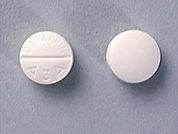Daraprim
Daraprim generic name: Pyrimethamine
What is Daraprim used for?
This medication is used with other medication (such as a sulfonamide) to treat a serious parasite infection (toxoplasmosis) of the body, brain, or eye or to prevent toxoplasmosis infection in people with HIV infection. Pyrimethamine belongs to a class of drugs known as antiparasitics. It works by killing parasites.
CHEMICAL NAME
DRUG TYPE
MalariaDaraprim Prices
Searching for the lowest prices
Daraprim Frequently Asked Questions
Take this medication by mouth as directed by your doctor, usually once or twice daily. Take this medication with food to decrease nausea and vomiting. If vomiting is severe or continues, your doctor may lower your dose or direct you to stop taking this medication. Your doctor will prescribe another medication (folic/folinic acid) to prevent blood problems caused by pyrimethamine. Follow your doctor's directions carefully. Drink plenty of fluids to prevent kidney problems if you are taking a "sulfa" medication with pyrimethamine.
This medication works best when the amount of drug in your body is kept at a constant level. Take this drug and other antiparasitic drugs regularly, exactly as prescribed by your doctor. To help you remember, take it at the same time(s) each day.
The dosage is based on the type of infection, your medical condition, age, and response to treatment. The length of time you will take this medication depends on your infection. Your dose must be carefully adjusted by your doctor to treat your infection and prevent serious side effects. Follow your doctor's directions carefully.
Do not take more or less of this drug than prescribed. Do not stop taking it before completing this prescription unless directed to do so by your doctor, even if you feel better. Skipping or changing your dose without approval from your doctor may cause the amount of parasites to increase, make the infection more difficult to treat (resistant), or worsen side effects.
Tell your doctor if your condition lasts or gets worse.
IMPORTANT: HOW TO USE THIS INFORMATION: This is a summary and does NOT have all possible information about this product. This information does not assure that this product is safe, effective, or appropriate for you. This information is not individual medical advice and does not substitute for the advice of your health care professional. Always ask your health care professional for complete information about this product and your specific health needs.
